|
|
|
Sort Order |
|
|
|
Items / Page
|
|
|
|
|
|
|
| Srl | Item |
| 1 |
ID:
193475
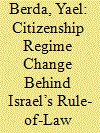

|
|
|
|
|
| Summary/Abstract |
This article delineates the relations between the judicial overhaul launched by Israel’s right-wing government in 2023 and the mechanisms of Israel’s control over Palestinians, demonstrating that they are two parts of a regime change. The essay traces a series of changes in Israel’s citizenship regime the past decade: the enactment of an anti-terrorism law and a nation-state law that defined the exclusive right of Jews to self-determination in Israel; the domestic application of surveillance and control practices developed in the occupied territories; and finally legislation allowing the revocation of Palestinians’ citizenship and the de facto annexation of the occupied territories.
|
|
|
|
|
|
|
|
|
|
|
|
|
|
|
|
| 2 |
ID:
044143
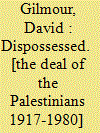

|
|
|
|
|
| Publication |
London, Sidgwick and Jackson, 1980.
|
| Description |
242p.: ill.hbk
|
| Standard Number |
0283986875
|
|
|
|
|
|
|
|
|
|
|
|
Copies: C:1/I:0,R:0,Q:0
Circulation
| Accession# | Call# | Current Location | Status | Policy | Location |
| 019318 | 956.9404/GIL 019318 | Main | On Shelf | General | |
|
|
|
|
| 3 |
ID:
151093
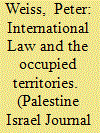

|
|
|
|
|
| Summary/Abstract |
There is indeed an international law applicable to the occupation, which dates back to the ius gentium practiced 2000 years ago in what is now Israel and the territory it occupies.
|
|
|
|
|
|
|
|
|
|
|
|
|
|
|
|
| 4 |
ID:
130511
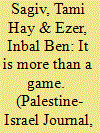

|
|
|
|
|
| Publication |
2011.
|
| Summary/Abstract |
The Sport Department at the Peres Center for Peace. together with its Palestinian partner organization the Al-Quds Association For Democracy and Dialogue, uses football (soccer) to create dialogue between girls and boys from lsrael and the Occupied Territories , enhancing peace-building '-efforts and strengthening their individual and social skills. In this way, young men and women are able to become vocal proponents for peace 'rather than powerless bystanders. The Twinned Peace Sport Schools for _Girls program - - which was established in 2006 after identifying the need for a separate girls' program -- annually bene?ts 100 girls between the 'ges ofnine and I5 from the surrounding Palestinian communities oFBei1 afafa, Beit Sahour. Jericho and Ein Rafa, and the underprivileged (mostly servative and right-wing) lsraeli communities ofKiryat Gat, Merchavim, eruham. liin Karem and Kibbutz Sde Yoav. This unique girls' program if _ s to accommodate religious and cultural considerations on both sides, ttract more girls and women to sports, promote gender equity and create ique opportunity for the participants to get to know "the other side." it project, while being sensitive to cultural needs, is still ditional ideas ofthe role ofgirls and women in society At the Peres Center for Peace, we believe that sports have the capacity Ztranscend factional con?icts and bring disparate groups together. Our s projects cut across pre-existing ties based on Israeli or Palestinian tonality and create new group identity
|
|
|
|
|
|
|
|
|
|
|
|
|
|
|
|
| 5 |
ID:
139140
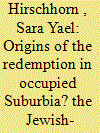

|
|
|
|
|
| Summary/Abstract |
Founded primarily by Jewish-American immigrants after the 1973 Arab–Israeli war, Efrat has emerged as one of the most highly recognizable settlements in the occupied territories. Drawing on archival materials, the periodical press, and interviews never before brought to light, this article both explores the untold history of this ‘city on a hilltop’ as the product of a quadrilateral relationship between American–Israelis, the Israeli government, the native Israeli settler movement, and local Palestinian communities, as well as reconstructing the discourses in the making of Efrat, which combine religio-political imperatives alongside a deeply Americanized vision of building new, utopian, suburbanized communities in the occupied territories, during its formative years between 1973 and 1987.
|
|
|
|
|
|
|
|
|
|
|
|
|
|
|
|
| 6 |
ID:
158820
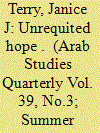

|
|
|
| 7 |
ID:
144593
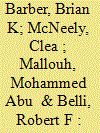

|
|
|
|
|
| Summary/Abstract |
This article summarizes a uniquely thorough study of the first generation of Palestinians to have lived the whole of their lives under occupation. Findings from group interviews and large, representative surveys of men and women from the West Bank, East Jerusalem, and the Gaza Strip in 2011 draw a complex portrait of day-to-day life both currently and historically, including: widespread political activism that they continue to prize; high levels of exposure to often demeaning political violence and restriction of movement; limited access to basic resources, low employment stability and poverty; high levels of social cohesion, but also of lack of safety, political instability, fear for the future, stress, and feeling broken. Most were not optimistic in 2011 about the peace process but remained, confident in their ability to manage what the future brings. The findings also show that each of the three territories has unique types and levels of challenges.
|
|
|
|
|
|
|
|
|
|
|
|
|
|
|
|
| 8 |
ID:
165813
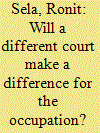

|
|
|
|
|
|
|
|